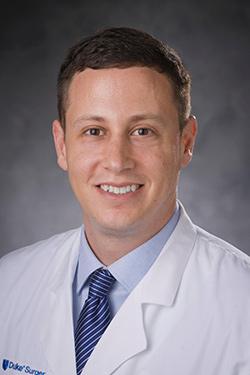
If you’ve tuned in to the popular TV shows The Good Doctor, Chicago Med, Royal Pains, and Elementary, it’s likely you’ve seen the work of Oren Gottfried, MD, a professor of neurosurgery in the Duke University School of Medicine.
Gottfried uses his expertise in medicine to serve as a medical consultant to the shows, providing writers and producers with perspective about the accuracy of the medicine depicted in the story line. If you look closely, you can see his name scroll across the screen in end-of-show credits.
“My goal is to help tell a story that’s accurate, that’s educational for a lot of people and shows good medical care and best practice,” said Gottfried.
The opportunity to work with Hollywood came eight years ago, when Gottfried was contacted by Jeff Drayer, MD, a 1998 graduate of Duke’s medical school who moved to Los Angeles after graduation and residency training and began to work as a TV producer in addition to practicing dermatology.
“We had a neurosurgery case, and I was actually looking for a friend of mine from med school who had since become a neurosurgeon at Duke.” While Drayer couldn’t locate his friend, he did find Gottfried. “Dr. Gottfried gave such great answers, and solved all our problems so well, I started calling him for other cases. I haven't stopped.”
 Dr. Gottfried on a television set.
Dr. Gottfried on a television set.As a physician, Gottfried specializes in complex spine surgeries. However, on the medical TV shows that he advises, patients and doctors deal with a smorgasbord of standard and rare diseases and procedures, everything from liver transplants to uncommon tumor resections to a massive fungal infestation. If a condition is outside his medical expertise, Gottfried reviews the scientific literature and consults with other doctors, residents, and staff at Duke.
Justin Barr, a fourth-year resident in the department of surgery, is one of Gottfried’s best collaborators. In addition to a medical degree from the University of Virginia, Barr has a PhD in history from Yale University, and completed his dissertation on the history of surgery.
“I think many Americans obtain much of their medical knowledge and understanding from these TV shows,” said Barr. “They think, ‘This is what I saw, so this is what I expect when I go in the hospital.’ We can reframe those expectations to create a more realistic interpretation of what’s going to happen that can only help both patients and doctors to have a firmer foundation of mutual understanding.”
Sometimes, says Barr, editing a script includes making sure the dialogue is realistic, such as when a character playing a surgeon asks for “six-inch, curved Metzenbaum scissors.”
“That’s just not something that someone would say in the operating room,” said Barr with a laugh.
 Dr. Gottfried on a television set.
Dr. Gottfried on a television set.The overlap of being a practicing physician and researcher in addition to working in entertainment is pretty rare. Many consultants, said Gottfried, are doctors toward the end of their medical careers or those who decided to transition from practicing physician to writer or consultant. For him, the balance is energizing.
“I always joke with the writers that their consultant is deep in the trenches,” he said. “I’m treating patients daily while also consulting and I feel like that perspective is unique.”
Taking care of his patients fills up each day, so Gottfried typically works on a script in the late evening hours.
“Patient care will always come first for me,” said Gottfried. “If anything, I think the research required for consulting has helped me be a better doctor.”